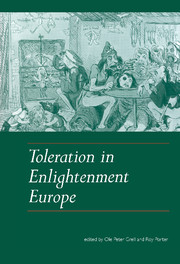Book contents
- Frontmatter
- Contents
- List of contributors
- Preface
- 1 Toleration in Enlightenment Europe
- 2 Toleration and the Enlightenment Movement
- 3 Multiculturalism and Ethnic Cleansing in the Enlightenment
- 4 Intolerance, the Virtue of Princes and Radicals
- 5 Spinoza, Locke and the Enlightenment Battle for Toleration
- 6 Toleration and Enlightenment in the Dutch Republic
- 7 Toleration and Citizenship in Enlightenment England: John Toland and the Naturalization of the Jews, 1714–1753
- 8 Citizenship and Religious Toleration in France
- 9 A Tolerant Society? Religious Toleration in the Holy Roman Empire, 1648–1806
- 10 Enlightenment in the Habsburg Monarchy: History of a Belated and Short-Lived Phenomenon
- 11 Toleration in Eastern Europe: the Dissident Question in Eighteenth-Century Poland–Lithuania
- 12 Toleration in Enlightenment Italy
- 13 Inquisition, Tolerance and Liberty in Eighteenth-Century Spain
- Index
4 - Intolerance, the Virtue of Princes and Radicals
Published online by Cambridge University Press: 03 February 2010
- Frontmatter
- Contents
- List of contributors
- Preface
- 1 Toleration in Enlightenment Europe
- 2 Toleration and the Enlightenment Movement
- 3 Multiculturalism and Ethnic Cleansing in the Enlightenment
- 4 Intolerance, the Virtue of Princes and Radicals
- 5 Spinoza, Locke and the Enlightenment Battle for Toleration
- 6 Toleration and Enlightenment in the Dutch Republic
- 7 Toleration and Citizenship in Enlightenment England: John Toland and the Naturalization of the Jews, 1714–1753
- 8 Citizenship and Religious Toleration in France
- 9 A Tolerant Society? Religious Toleration in the Holy Roman Empire, 1648–1806
- 10 Enlightenment in the Habsburg Monarchy: History of a Belated and Short-Lived Phenomenon
- 11 Toleration in Eastern Europe: the Dissident Question in Eighteenth-Century Poland–Lithuania
- 12 Toleration in Enlightenment Italy
- 13 Inquisition, Tolerance and Liberty in Eighteenth-Century Spain
- Index
Summary
Toleration is often taken to be a virtue, both in a loose and a strict sense. It has been said to be the ‘liberal virtue par excellence’. Modernity is likewise generally considered its temporal birthplace. Whether toleration is in fact a trait which one ought to cultivate in oneself and encourage in others is a philosophically taxing question. It may appear to be more complex at the end of the twentieth century than at any other time, but one should be wary of that assumption. Reading through the body of European literature, including that produced in the seventeenth and eighteenth centuries, it is clear that toleration was the subject of considerable intellectual scrutiny, particularly by those critical of it as an idea or a policy. Amongst its advocates, who, as is well known, were primarily concerned with religious toleration, it was by no means always a simple or indeed lucid idea. Notable within Enlightenment writings on toleration is the relative paucity of arguments in its favour founded on the conception of toleration as a virtue. Even its proponents presented it mostly as a means to an end or as commanded by the exigencies of logical consistency. Often the arguments for toleration made toleration itself entirely redundant as they belittled what was to be tolerated into sheer insignificance.
Voltaire and Rousseau led their readers to endorse religious toleration, or see that a true social contract would endorse it, by dint of disputation which did not rest on the goodness of acts of toleration or the fact that tolerance is morally edifying, an enhancement of one's moral character or persona.
- Type
- Chapter
- Information
- Toleration in Enlightenment Europe , pp. 86 - 101Publisher: Cambridge University PressPrint publication year: 1999
- 1
- Cited by



